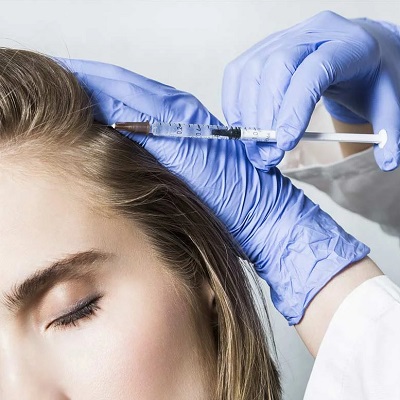 Age, stress, heredity, or an autoimmune disease may all contribute to hair loss. Moreover, those with either acute or pattern hair loss may also feel symptoms of melancholy. Further, even topical or oral meds that work effectively might have unwanted side effects. Similarly, many hair loss treatments and supplements are on the market. It can be difficult to determine which of these products are beneficial. Many people thought that a hair transplant via plastic surgery was the best option for a long time. Still, many patients are concerned about the serious negative effects of having surgery. Fortunately, dermatologists can stop hair loss without surgery using platelet-rich plasma, or PRP, therapy. This blog will explore PP treatment for hair loss and whether it works.
Age, stress, heredity, or an autoimmune disease may all contribute to hair loss. Moreover, those with either acute or pattern hair loss may also feel symptoms of melancholy. Further, even topical or oral meds that work effectively might have unwanted side effects. Similarly, many hair loss treatments and supplements are on the market. It can be difficult to determine which of these products are beneficial. Many people thought that a hair transplant via plastic surgery was the best option for a long time. Still, many patients are concerned about the serious negative effects of having surgery. Fortunately, dermatologists can stop hair loss without surgery using platelet-rich plasma, or PRP, therapy. This blog will explore PP treatment for hair loss and whether it works.
How Does PRP Treatment Works for Hair Loss?
During PRP treatment for hair loss, the professional hair transplant surgeon injects your blood into the hair scalp where there is hair loss. Therefore, this platelet-rich plasma acts as a catalyst to activate growth factors. Moreover, this PRP is a useful protein that the body uses for several functions. Further, these growth factors can strengthen hair follicles by enhancing circulation in the treated region, preventing hair loss.
The outcome is thicker, healthier-looking new hair growth at the injection location. These growth factors also aid in the healing and reactivation of hair follicles. It increases the amount of hair in the affected region. In addition, the proteins activate the cells, which aid in developing new hair. This implies that PRP therapy counteracts hair loss by strengthening hair follicles. It works for thicker hair and reactivates dormant hair follicles for new development.
How Long Does PRP Last?
Although PRP therapy for hair loss has long-lasting effects, maintenance sessions are usually necessary to keep the benefits going. Hair professionals advise having a touch-up treatment around once a year to retain the full benefits of PRP therapy. It may have effects that last up to 18 months after the original round of injection treatments.
Advantages of PRP in Comparison of Other Hair Loss Treatments?
Using your blood cells and plasma in the mixture is one of the key advantages of platelet-rich plasma hair treatment. Unlike other therapies, it implies no chance of an allergy or adverse response. The low risk of side effects, which many people are concerned about with alternative hair loss treatments, is another advantage of PRP.
The risk of erectile dysfunction may rise with the use of male-pattern baldness medication. However, other therapies for women, like minoxidil, may have unfavorable side effects, including low blood pressure and increased facial hair. Many individuals suffering hair loss choose PRP hair treatment since it is a less invasive, low-risk procedure that does not need pharmaceutical drugs or downtime.
Consult with a Hair Specialist for PRP Treatment for Hair Loss
An initial consultation with a licensed healthcare provider is crucial before undergoing PRP therapy for hair loss. During this consultation, they conduct a comprehensive evaluation to determine the cause(s) of hair loss and if PRP is a suitable solution. Providers review patients’ medical history to ensure PRP therapy aligns with their health and any pre-existing disorders. They will customize treatment plans based on the patient’s preferences and needs.
Patients should make reasonable expectations to ensure informed decision-making. The doctor will discuss other hair loss remedies or combinations. The hair surgeon will address all the questions and concerns during the consultation. Dr Naveed Azhar, the best and most highly skilled consultant surgeon, can help you in Islamabad. You can consult him at RHT-PK.
Conclusion
Research indicates that Platelet-Rich Plasma (PRP) therapy, a non-invasive treatment for hair loss, has the potential to rejuvenate hair and promote natural growth. PRP harnesses the body’s healing capacity, making it a promising solution for those concerned about hair loss. However, having reasonable expectations and consulting with trained specialists is crucial to determining if PRP therapy suits a specific case. PRP is a practical choice for healthier, fuller hair as the field of regenerative medicine develops. It is recommended to consult with a medical expert to determine if PRP therapy is a suitable fit for hair restoration goals.



Leave Your Comment